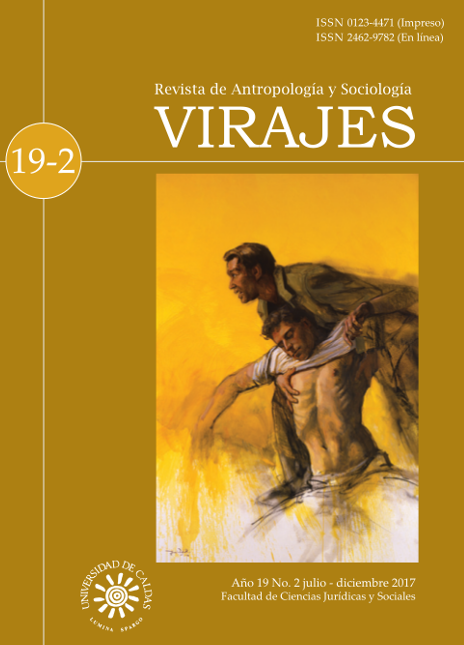Authors
Abstract
The present study aims to reflect on the origin and transformation of the collective creation of Latin American theater, an artistic action form that since the 50’s and 60’s found in the real historic a focus of aesthetic-poetic exploration to reconfigure its expressive modes and get closer to the reality with the communities from a more committed way. Through a perspective analysis, situated on some representative plays by the emblematic groups from the Latin American region, and in particular from Colombia, a reading is done in parallel to the postulates of the Participatory Action Research, to observe how behind these artistic objects, an investigative process of high commitment is produced in search for social change, as critical social science proposes. The study shows how this form of scenic creation keeps testifying social reality, and in special the armed conflict, not just from the testimony and denunciation, but appealing to the memory from liminal procedures as well.
References
Aponte, M. (2007). Relación Suda-k-ribe: arquitecturas del recuerdo “donde el viento hace buñuelos”. I Congreso Iberoamericano de Teatro. Encrucijadas del Teatro Latinoamericano actual, Manizales, Colombia.
Boal, A. (1975). Técnicas latinoamericanas de teatro popular: una revolución al revés. Buenos Aires, Argentina: Corregidor.
Boudet, R.I. (2000). Memoria y desmemoria en el teatro latinoamericano. Revista Teatro CELCIT, 13-14, 21-25.
De Costa, E. (1992). Collaborative Latin American Popular Theatre: From Theory to Form, From Text to Stage. New York, USA: Peter Lang.
Dubatti, J. (2012). Cien años de teatro argentino. Desde 1910 hasta nuestros días. Buenos Aires, Argentina: BIBLOS, Fundación OSDE.
Diéguez, I. (2007). Yuyachkani: políticas del cuerpo, testimonio y memoria. I Congreso Iberoamericano de Teatro. Encrucijadas del Teatro Latinoamericano actual, Manizales, Colombia.
________ (2014). Escenarios Liminales. Teatralidades, performatividades, políticas. México, D.F. Toma, Ediciones y Producciones Escénicas y Cinematográficas. actual,
Fals Borda, O. (1987). Investigación participativa. Montevideo, Uruguay: La Banda Oriental.
García, C. (2012). Teatro híbrido. Representaciones contemporáneas de violencia, muerte y dignidad en el teatro colombiano. Bogotá, Colombia: Ministerio de Cultura.
Jaramillo, M. (1992). El nuevo teatro colombiano. Arte y política. Medellín, Colombia: Universidad de Antioquia.
La Candelaria. (1986). Cinco obras de creación colectiva. Bogotá, Colombia: Editorial Colombia Nueva.
Pinta, M.F. (2010). Escenarios intermediales. De los happenings a la web 2.0. Telondefondo. Revista de Teoría y Crítica Teatral, 11, 1-13.
Rubiano, F. (2016). Matarás por no matarás. Seminario Post-acuerdo: diálogos desde la cultura. XXXVIII Festival Internacional de Teatro de Manizales, Manizales, Colombia.
Rubio, M. (2007). ¿Qué fue del teatro Latinoamericano? I Congreso Iberoamericano de Teatro. Encrucijadas del Teatro Latinoamericano actual, Manizales, Colombia.
Sánchez, J. (2012). Prácticas de lo real en la escena contemporánea. Madrid, España: Visor libros.
Trastoy, B. (2001). Nuevos procedimientos narrativos en el teatro latinoamericano de los 80 y los 90. Revista Teatro CELCIT, 19-20,
Villasante, T. y Montañés, M. (2000). Algunos cambios de enfoque en las ciencias sociales. La investigación social participativa: construyendo ciudadanía. Madrid, España: El Viejo Topo.
Zamosc, L. (1992). Campesinos y sociólogos: reflexiones sobre dos experiencias de investigación activa en Colombia. En Salazar, M.C. (coord.), La investigación-acción participativa: inicios y desarrollos (pp. 82-134). Madrid, España: Editorial Popular.

 PDF (Español)
PDF (Español)
 FLIP
FLIP


















